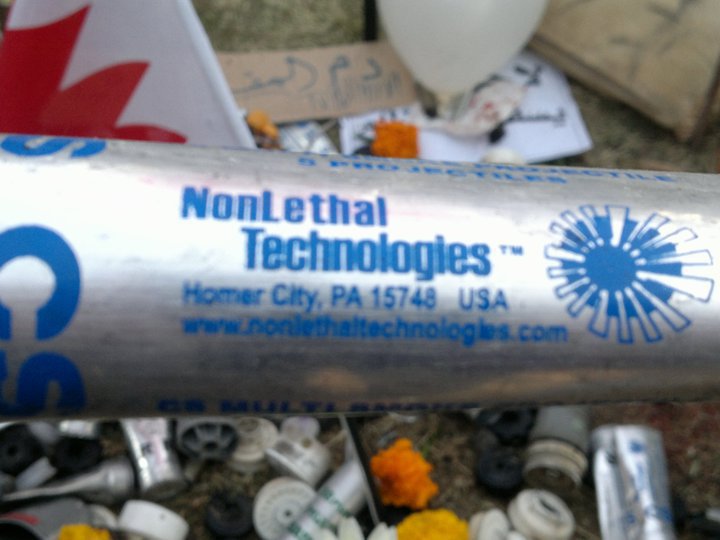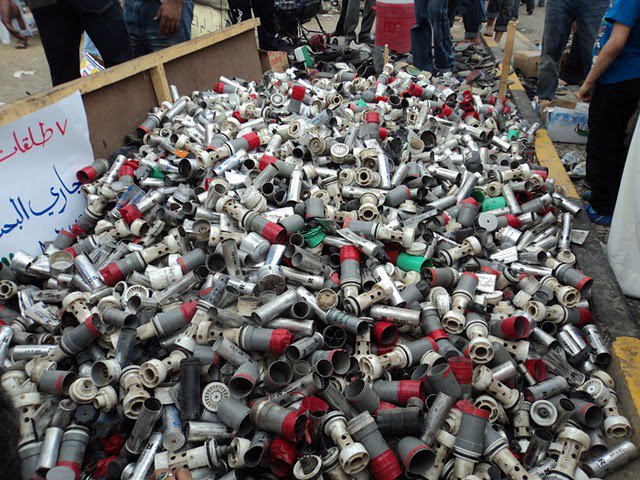US and British-Backed Bahrain Regime: the Use of “Toxic Terror” in Collective Punishment

After more than five months of popular opposition to its autocratic rule, the US and British-backed unelected monarchy in Bahrain is deploying a new tactic of repression – toxic terror.
Unable to thwart widespread calls for democratic freedom, the Western-backed Bahraini dictatorship is targeting vulnerable civilians – the young, elderly and infirmed – in a bid to crush the pro-democracy movement.
Regime forces have launched a campaign of massive, indiscriminate firing of tear gas into villages and homes – with horrific effects. With thousands of canisters dispensed in the past fortnight alone, whole villages have become shrouded in toxic fumes on a daily basis.


Five civilians, including women, physically disabled and a five-year-old boy, have died so far from suffocation resulting from regime forces firing tear gas canisters into homes. In such attacks, the dwellings quickly become thick with the acrid smoke released by these weapons. The elderly and weak cannot escape from the lethal exposure.
In the last two weeks, state military forces have stepped up attacks on family homes in mainly Shia villages, which are seen as supportive of the pro-democracy movement.
“This is a deliberate, systematic tactic of terrorising people,” says Nabeel Rajab, president of the Bahrain Centre for Human Rights. “This is not just a case of a few officers behaving randomly. We are seeing entire villages coming under sustained attack with thousands of gas canisters thrown into homes by uniformed riot police who ride into villages in Ministry of Interior jeeps. These deadly attacks could only be carried out on the orders of the regime’s rulers.”
The Persian Gulf island kingdom, where the US Navy Fifth Fleet is based, is ruled by the Al Khalifa royal family headed by King Hamad bin Isa Al Khalifa. He is also the supreme commander of the Bahraini armed forces.
The unelected Sunni regime, described by Washington and London as a key ally, has been in power since Bahrain was granted independence from Britain in 1971. The prime minister, 77-year-old Shaikh Khalid bin Salman Al Khalifa (uncle of the king) is the longest unelected premier in the world. Some 80 per cent of the unelected ministerial cabinet – appointed solely by the king – are members of the royal family, as are senior officers in the military forces.
Inspired by the Arab Spring pro-democracy movements sweeping the Middle East and North Africa, Bahrain’s Shia majority population took to the streets on 14 February calling for democratic rights. The Shia – who represent 70 per cent of the national population – have long suffered political and economic discrimination under the Sunni dynasty.
Both Washington and London backed a Saudi-led invasion force into Bahrain in mid-March to crush the peaceful protests. Since then, military from Saudi Arabia and the United Arab Emirates have supported Bahraini forces in a brutal crackdown against pro-democracy protesters. The crackdown has resulted in some 40 civilians deaths, over 1,000 illegal detentions, torture of detainees and hundreds of show trial prosecutions held in military courts.
Among those prosecuted are doctors, nurses, teachers, lawyers and journalists, who have been charged with ludicrous crimes such as “inciting hatred against the rulers” and “subversion on behalf of a foreign enemy” (implying Iran).
Some 2,500 workers, invariably from the Shia population, have also been sacked from their jobs. Sporting clubs, athletes and critical websites have been banned as part of the state crackdown.
However, the wave of repression – condemned by international human rights groups – has failed to halt the pro-democracy movement. At a recent rally in Duraz and Saar, over 100,000 people turned out maintaining their demand for “self determination” [1]. This turn-out from a national population of only 600,000 is comparable with the heyday of massive popular mobilisations against the regime during February and March.
“This shows that the repression by the regime and its allies has failed,” says Rajab. “They have not intimidated the people from demanding their democratic rights.”
Rajab, who last month was awarded the Ion Ratiu Democracy Award by the Washington-based Woodrow Wilson International Center for Scholars for his human rights work, says that the inability to suppress calls for democratic change is why the Bahraini regime has now resorted to a new tactic of “collective punishment” of civilians.
“Despite extrajudicial killings, mass incarcerations and routine torture, the regime realises that these methods have failed to defeat the popular opposition. Now they have moved to collective punishment by going into villages and terrorising people with deadly use of tear gas,” says Rajab.
Many amateur videos attest to the use of this terror tactic by the Bahraini pro-state forces [2].
In one such attack, 47-year-old mother-of-two Zainab Hasan Al Jumaa died from asphyxiation [3]. The woman, who was disabled, could not escape from her home as it filled with tear gas.
A week after Al Jumaa’s death, police forces returned to her village of Sitra on 22 July and repeated the attack on her home. In a video, adults are seen desperately trying to evacuate terrified young children from an upstairs room using ladders [4].
Four other people have died from similar intoxication in their homes. The most recent victim was Isa Ahmed Altaweel (59) who was buried on the first day of the Muslim holy month of Ramadan that began on 1 August.
The youngest victim was five-year-old Mohammed Farhan. He already suffered from a medical condition and died after tear gas pervaded his home in Sitra. The oldest was 71-year-old Isa Mohammed who died when his home in Ma’ameer came under a barrage of poisonous gas.
Ironically, the rampant use of tear gas as a terror tactic comes more than a month after the Al Khalifa rulers declared an end of a state of emergency. This was supposedly meant to signal the scaling down of “security” measures, including the departure of Saudi and Emirati forces, to facilitate a “national dialogue” for political reforms.
The US and British governments have hailed the regime’s alleged reform process as a positive step. But the pro-democracy movement in Bahrain has dismissed it as a cynical public relations exercise that has no intention of initiating meaningful democratic change.
The recent appointment by King Hamad of an international committee of inquiry into “alleged human rights abuses” also falls into the category of hollow public relations.
As one pro-democracy activist said: “How can a regime pretend to be serious about dialogue, democracy and human rights when it continues to kill and injure innocent civilians in their homes?”
Bahraini security sources and independent witnesses have told Global Research that Saudi and Emirati military personnel continue to operate clandestinely in Bahrain alongside state police. The Saudi and Emirati military wear Bahraini Ministry of Interior uniforms and are involved in the tear gassing of civilian residences.
Another sinister factor is the ongoing military occupation of hospitals by the Bahraini regime and its Gulf allies. Because of this, hundreds of people are not receiving medical treatment at hospitals, according to the humanitarian organisation Medecins Sans Frontieres. Victims of state violence are afraid to seek treatment because they are at risk of being arrested and tortured.
Nabeel Rajab, whose own home has been attacked with tear gas on three occasions, says: “The regime is trying to terrorise people into not supporting the pro-democracy movement. But it is not succeeding. People are more united and more determined than ever to push for their democratic rights because they are angered and disgusted by the brutality of this regime.”
That anger and disgust is also being directed at Western governments and mainstream news media. While the latter have been giving extensive coverage of alleged state violations in Libya and Syria, the evident crimes of the Western-backed Bahraini regime go largely unreported.
The US and British governments give unswerving political support to the Al Khalifa monarchy, talking up “reform progress” by the regime. And, in contrast to Libya where Washington and London have championed an enclave of armed rebels against the popular Gaddafi government, the peaceful pro-democracy movement in Bahrain has received no support.
Indeed, the American and British governments continue to supply the Bahraini regime with military weapons, including the tear gas that is now being used to suffocate and terrorise men, women and children in their homes.
Global Research has seen spent canisters retrieved from homes that bear the manufacturer’s details. One such company is the oddly named Nonlethal Technologies, based in Homer City, PA, USA. When contacted, a spokesman for the company declined to make a comment on how its technology was being deployed lethally in Bahrain.
The US arms trade with Bahrain is worth $200 million every year. On a per capita basis, that exceeds the US military supplies to Israel or Egypt. The British government also describes Bahrain as “an important market” for arms. Saudi Arabia and the United Arab Emirates are another huge destination for American and British weaponry.
According to the British government, export licences for weapons are granted on the basis that such arms “are not used for internal repression”. Washington also indulges in similar semantics.
However, given the blatant use of tear gas by the Bahraini, Saudi and Emirati forces not just as a means of internal repression but as a weapon of full-frontal state terrorism, the US and British governments are clearly in breach of their own self-declared export licensing standards.
Which makes one wonder what is the most toxic? Bahraini state terrorism or the putrefied cynicism of American and British foreign policy?
Finian Cunningham is a Global Research Correspondent based in Belfast, Ireland. He was expelled from Bahrain for his critical journalism on 18 June 2011.
NOTES
[1] Despite months of brutal repression, a massive protest in Duraz, Saar on Friday 29 July.
[2] Residents terrified after Saudi/Emirati/Bahraini forces fire teargas into a houses.
http://www.youtube.com/watch?v=fjssenG1ZZE&feature=share
Teargas released into residential neigbourhood late at night.
http://www.youtube.com/watch?v=iS-CXR_W-qY
Policeman in Bahraini military police uniform walks up to house front and lobs teargas into dwelling in Sitra, Bahrain, on 15 July.
http://www.youtube.com/watch?v=VksoiNtDhHM
One policeman kicks down front door of a house and a second one lobs teargas canister into dwelling on 15 July.
http://www.youtube.com/watch?v=PTsf3wUZbe0&feature=related
Teargas lobbed into house in Duraz on July 23.
http://www.youtube.com/watch?v=E-agRyqW2Fw
Another such attack on 22 July; one can hear the voice of frightened girl making the video.
http://www.youtube.com/watch?v=hCPVT9lSVyw&feature=share
House spewing smoke after being attacked with teargas. Soon the house catches fire.
http://www.youtube.com/watch?v=vkEKPsI1Dzk
[3] Death of mother-of-two Zainab Hasan Al Jumaa after police fire teargas into home in Sitra on 15 July.
[4] Police repeat attack on house of Zainab Hasan Al Jumaa on 22 July, one week after her death. Terrified children being evacuated from upstairs room with a ladder.
http://www.youtube.com/watch?v=YaPVUdWyTfY&feature=youtu.be

